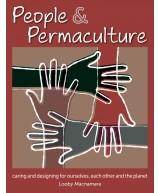 Source: Permanent Publications
Source: Permanent Publications
Publisher:
Pemanent Publications
Summary
In this book, Looby Macnamara explores the idea of bringing permaculture into our personal lives and relationships to enable us to become the people we want to be before we try to change the world for the better. She does have hope of a better society based heavily in permaculture and talks about the steps we need to get there. She focuses on health care and education systems in particular but looks at people and permaculture in very specific senses and very broad ones as well.
Where to get it?
Amazon.com
amazon.co.uk
amazon.ca
amazon.au
Related Videos
Related Threads
How Permaculture Can Help Your Relationships
People & Permaculture Book Review
Community Forum
Related Websites
Looby's Website
Looby Macnamara at Permaculture Women





 2
2




 2
2















